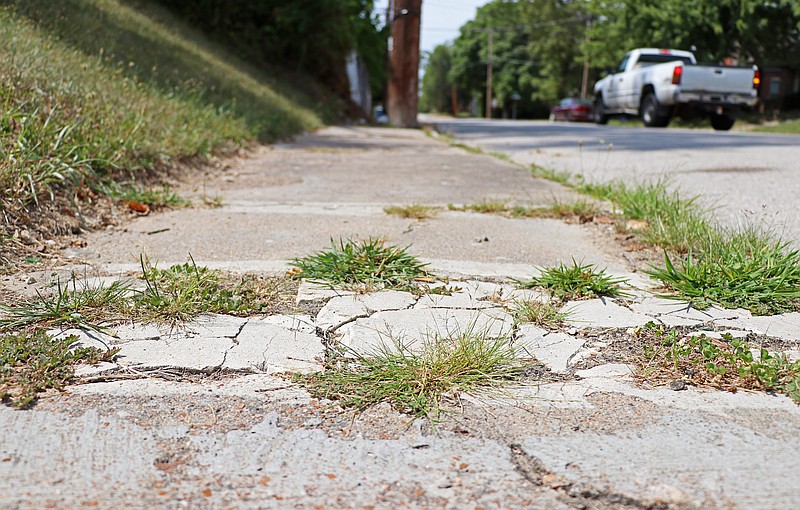After several property owners spoke in opposition Monday evening, the Jefferson City Council held off voting on a controversial sidewalk bill.
The City Council placed a bill that would require adjoining property owners to repair sidewalks when a vertical displacement of a quarter of an inch exists within any sidewalk on the council's informal calendar.
City code currently allows an offset of 1.5 inches.
Council members said they wanted to review the bill further before voting on it. If no action is taken, items on the informal calendar expire after three meetings.
The change would allow the city to meet the Americans with Disabilities Act, Jefferson City Public Works Director Matt Morasch said.
Several sidewalks currently in compliance would no longer be in compliance if the council approved the amendment, according to the proposed bill.
Several property owners said the standard would be a burden, especially on lower-income individuals and property owners who recently sustained property damage during the May 22 tornado.
Danny and Bonita Vaught live in the old southside neighborhood, which was hit by the EF-3 twister.
"You're thinking about telling these people in the southside, whose median income is $30,000 (and who) have a hard enough time recovering from this tornado, and you're going to tell them that you're wanting to implement this ordinance to penalize them again?" Danny Vaught said. "That's what they're feeling like, being penalized a second time."
Some residents could grind off the offset so the sidewalks meet the proposed code, Morasch said.
While Ward 4 Councilman Ron Fitzwater said he appreciated city staff for presenting the proposed bill since it is an issue the council needs to address, he did not believe "the optics of it are right for our community right now."
"Our community has gone through two tremendous, catastrophic events and we've got a lot going on," he said. "We've got a staff that's stretched and (this may) add potential additional workload."
The city does not know the fiscal impact if the council were to approve the amended ordinance, according to the bill.
However, the bill notes city staff anticipate the amendment would "generate the need for additional enforcement and inspection to attain compliance, or administrative time in contracting and tax billing of properties if compliance is not achieved."
Code enforcement officials would look at sidewalk displacements if the city receives complaints, Morasch said, which is what city staff currently does.
"We don't proactively go out and search these out," Morasch said. "It's on a complaint basis."
The city receives about 10 complaints a year regarding sidewalk repairs and displacements, he added.
Roger Schwartze said he took a No. 2 pencil, which is a quarter of an inch thick, and measured the sidewalks along Eastland Drive. Of the sidewalks he measured, Schwartze said, all of the adjoining property owners would be in violation if the council approved the proposed bill.
Schwartze added it was not reasonable for the city to require adjoining property owners to maintain sidewalks to that high of a standard.
"What neighbor goes and puts something over here on their property and then goes next door and tells their neighbor, 'You're going to have to maintain this to a very high standard?'" Schwartze asked the council. "The neighbor would laugh at him, but that's what this ordinance really does to the citizens of Jefferson City because, in the case of Eastland Drive, the city built the sidewalk on city right-of-way with city funds and now you're turning around and asking the property owners to maintain it."
For several decades, city code has required adjoining property owners to repair and maintain sidewalks, whether that be clearing them of snow or ensuring they are level, Morasch said.
The city owns the rights-of-way under the form of fee in trust, which means the city owns the property "in trust for the benefit of the public," City Counselor Ryan Moehlman previously said. The city is responsible for maintaining the rights-of-way in a safe condition but can delegate that responsibility to adjoining landowners, Moehlman added.
The city has some funds set aside to construct or repair sidewalks, Morasch said, but not enough to address all of the sidewalk issues.
The bill also clarifies requirements regarding sidewalk repairs. For example, according to the bill, if utility work, construction or defective sidewalks require sidewalk ramps, the adjoining property owner or those undertaking the utility or construction work must construct a sidewalk ramp. If an existing sidewalk ramp is impacted due to defective sidewalks, utility work or construction, it must be repaired or rebuilt.
Matt Kohly, with Socket Telecom, LLC, spoke in opposition of requiring utility and construction companies to upgrade the sidewalks when they are working in the rights-of-way.
"This will increase Socket's cost of installation and construction of its network, therefore making it harder for Socket to meet the demand for its broadband services, for which we have had citizens and businesses asking us to provide service," he said.
Council members said they may review this bill at their next meeting Sept. 3.
In other business Monday, the City Council approved the 2019 property tax rates in Jefferson City, which will remain the same at the current rate of $0.5561, Jefferson City Finance Director Margie Mueller said.
The proposed tax rate for the general fund would be $0.46 on the $100 valuation, according to the bill. This is the current tax rate.
To create and maintain a fireman's retirement system for Jefferson City fire firefighters, the proposed tax rate is $0.0961 on the $100 valuation, according to the bill.
The city anticipates receiving more than $4 million in property taxes for the general fund and nearly $856,000 for the firefighters' retirement fund in the fiscal year 2019, which began Nov. 1, 2018, and ends Oct. 31, city staff said previously.
The city anticipates receiving more than $4.1 million in property taxes for the general fund and more than $865,00 for the firefighters' retirement fund, the bill states.

